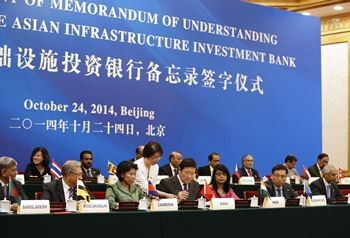Officials with the International Monetary Fund have expressed anticipation to cooperate with the China-initiated Asian Infrastructure Investment Bank (AIIB), according to an article published by CRIENGLISH.com.
Chikahisa Sumi, assistant director of IMF's Asia and Pacific Department, made the remark during a forum attended by IMF officials and members of U.S. think tanks in Washington, D.C., the report said.
"We are looking forward to the collaboration with AIIB. We also welcome any help to finance this vast, vast need to upgrade and solve the infrastructure bottleneck, which is constraining that growth on the supply-side at the moment," the IMF official said as he stressed the importance of the AIIB as a funding mechanism for infrastructure investment.
"Infrastructure investment need is huge, is simply huge. And then infrastructure investment is very productive investment. And then, it has the potential of crowding in private-sector investment. So, developing countries usually lack that funding mechanism for that needed infrastructure investment," Sumi said.
The AIIB, which was formally established in Beijing last December, will hold its inaugural ceremony in Beijing on Saturday, Jan. 16.
Top Chinese leaders like President Xi Jinping and Premier Li Keqiang are expected to attend the opening of the AIIB, Foreign Ministry spokesperson Hua Chunying announced.
Xi will attend and address the inauguration ceremony in the morning, while Li will address the founding conference of the AIIB council in the afternoon, Hua said.
The report said that the AIIB opening activities will be held from Jan. 16 to 18.
The China-initiated development bank has now 57 members and is seen as a potential rival to the World Bank and the Asian Development Bank.
AIIB, which has an authorized capital of $100 billion and subscribed capital of $50 billion, will invest in sectors including energy, transportation, urban construction and logistics as well as education and healthcare.
The three largest shareholders of the bank are China, India and Russia, owning 30.34 percent, 8.52 percent, 6.66 percent, respectively.






















